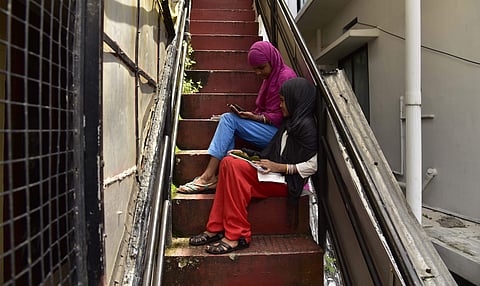

On June 1, 2020, amid its stupendous efforts to fight the pandemic, Kerala reopened its schools, completely online. The students were to attend their classes via the Kerala Infrastructure and Technology for Education website, as part of the government's First Bell initiative. The same lessons were broadcast on television through the Victers channel. Undoubtedly, the initiative was lauded. But at the same time, this also raised an important question — do all students in the state have the means to access these lessons?
A survey by the state's General Education Department on May 10 had stated that 2.61 Lakh students in the state did not have access to online classes. The number drastically reduced to 1.5 Lakh on June 1, the day in which the classes began. The number further came down to 42,412 on June 8, according to a statement submitted at the High Court on June 9, following a PIL. Three days later, the number dropped 17,774 and then on June 13, the number was as low as 2,800. This further came down to 872 and on June 18, it was reduced to 89.
Hearing four different writ petition, seeking the government's intervention to bridge the digital divide in the state, in order to continue the online lessons, Kerala High Court Judge Justice Shaji P Chaly observed that "the State Government have taken adequate steps at present to safeguard the interests of the students."
At the same time, the court has asked the government and the concerned authorities to "be watchful and make necessary inquiries to understand the true fact situations in order to translate the true intentions of Article 21A of the Constitution of India (free and compulsory education to all children aged 6 to 14) and the provisions of (the Right of Children to Free and Compulsory Education) Act, 2009. "It also noted that adequate steps are to be taken by the State Government for ensuring that, not even a single child is deprived of education. Disposing of the writs, the court also directed the government machinery to make periodical inspections and verifications throughout the State to ensure that every child participates in the online education process.
"The Government is also aware of the fact that there are certain areas where, due to lack of electricity supply, the classes could not be viewed and in such circumstances Government have taken steps to download the classes and relay the same using alternative methods, thereby ensuring that no student is denied of the availability of the classes and a continuous education process," reads the judgment. "The students are also requested to be in constant touch with the teachers and co-students through phone or other social media to share views of the online classes and clarify their doubts with their respective teachers," it adds. The government also states that inorder to help the students from the deprived classes, necessary arrangements have been made in the nearby public establishments like Community Centres, Anganwadis, Libraries and Akshaya Centres.
The issue of accessibility came to the forefront, after Devika, a IX grader from Malappuram died of suicide on June 1. A daily wage labourer's daughter, she allegedly had no way to access the classes, since her TV was damaged and her father, who was unemployed due to the lockdown, had no means to get it repaired. Since then, many politicians, activists, popular figures, sociopolitical organisations, NGOs and even common people had kick-started initiatives to provide televisions and smartphones to the underprivileged.
Anwar Sadat, the KITE Director admits that this wasn't achieved completely because of the government's intervention. "I'd thank the spirit of Malayalis. When we saw that this was a serious issue, the community worked together to make sure that no one is left behind. Even the government order mentions that 'not a single student will be left out'," he says. "We will soon bridge the current minor gap too. This is a continuous intervention," he adds.
